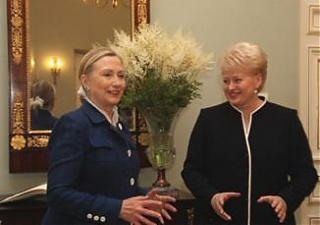Analytics, Baltic States – CIS, EU – Baltic States, Legislation, Lithuania, USA
International Internet Magazine. Baltic States news & analytics
Friday, 09.05.2025, 08:01
Lithuanian-U.S. cooperation priorities discussed between Grybauskaite and Clinton
 Print version
Print version |
|---|
| Hillary Clinton and Dalia Grybauskaite. Vilnius, 1.07.2011. Photo: president.lt |
According to the President, new energy security related challenges are defining new guidelines for cooperation with the United States. The search for alternative energy sources and their supply routes as well as the development of safe nuclear energy in the European Union and outside its boundaries are matters of common interest for Lithuania and the United States. United States Secretary of State Hillary Clinton congratulated Lithuania on the passage yesterday by the Seimas of the amendments to the law on natural gas. The amendments, implementing the Third EU Energy Package, would serve as a guarantee of Lithuania's and the region's energy security, informed BC presidential press service.
"Secretary of State Hillary Clinton assured that the United States well understands and actively supports Lithuania's efforts to ensure its energy independence. I am very pleased that we are cooperating on the new Visaginas nuclear power plant project, with two US companies participating in the process, as well as with respect to using shale natural gas and building a LNG terminal," the President said.
The U.S. Secretary of State also expressed support to Lithuania's stand that nuclear power plants proposed to be built in its neighborhood should meet the highest international safety and environmental standards, while the nuclear power plant planned for construction by Belarus in Astravets, close to Vilnius, should be relocated further from the Lithuanian border.
Among the other issues discussed at the meeting were the ongoing processes in neighboring Eastern countries. The President pointed out that only independent and democratic countries could ensure a secure neighborhood and safe nuclear energy development; therefore it was important to seek more openness: to make it easier for people to cross borders, to open universities, to promote business consultations.
According to the President, the United States has always been Lithuania's most important partner and ally in regional security. Cooperation between the two countries in NATO, the President said, is already producing results: we have real contingency plans for the Baltics, preparations are underway to ensure cyber and energy security, Lithuania's Energy Security Center is evolving into a NATO center of excellence, Lithuanian servicemen are participating in the most difficult NATO missions. President Dalia Grybauskaite and Secretary of State Hillary Clinton also touched on the contribution made by Lithuanian Americans to the development of economic and cultural contacts as well as bilateral relations. There are between 700000 and one million people of Lithuanian origin living in the United States, including 40600 Lithuanian citizens. The strong and numerous Lithuanian American community, the President said, contributed in a major way to strengthening US-Lithuanian economic, cultural and scientific ties. According to the President, American investments in Lithuania are very important, but just as important is cooperation in innovations and the development of Lithuanian business in the United States, especially in the Silicon Valley.
U.S. Secretary of State Hillary Rodham Clinton said Friday that the rule of law, political parties and democratic institutions must emerge in the Arab world if it is to emulate Eastern Europe's remarkable transition two decades ago from authoritarianism to truly free societies, LETA/AP reports. In Lithuania for an international democracy conference, Clinton cited the real risk of Middle East and North African nations slipping back into autocratic old ways. And she lamented the latest accounts of violence in Syria, with security forces and knife-wielding, government-organized thugs reportedly attacking protesters in the city of Aleppo.
"Today there are new democracies fighting for life, there are vicious autocrats clinging to power," Clinton said in a speech at the "Community of Democracies" meeting. "This is an hour or need. And every democracy should stand up and be counted."
Drawing on the experience of Lithuania and other countries that opened up when the Iron Curtain came down 22 years ago, Clinton outlined a series of fundamentals she said were necessary for nations to make the transition to democracy: institutions rooted in law; equality for all, including women; a free press; economic opportunity; legitimate leaders.
The implicit warning was that it is uncertain if the Arab reform movements will translate into stable democratic societies. While Tunisia and Egypt try to find their own formulas for a new system of governance, the would-be democrats of Syria may never get their chance.
Speaking at a news conference in the Lithuanian capital of Vilnius, Clinton said Syrian President Bashar Assad's regime wasn't sending a coherent message. She noted how it allowed an opposition meeting in Damascus this week, while pressing on militarily in the north.
"We know what they have to do," Clinton said. "They must begin a genuine transition to democracy and allowing one meeting of the opposition in Damascus is not sufficient action toward achieving that goal."
Clinton said Assad's government is running out of time and it must advance a serious political process or face increased resistance.
The democracy conference was being held only a short distance from Belarus, Europe's last autocratic stronghold, where authorities are cracking down on demonstrators amid the country's worst financial crisis since the fall of the Soviet Union.
Clinton lamented the brutal repression in the country and how the government denies its citizens the most basic rights. President Alexander Lukashenko's iron fist has long been an asterisk to democratic change in eastern Europe, and the Obama administration is alarmed by the rapidly deteriorating situation.
Without mentioning either country by name, Clinton also expressed concerns about the political motivations behind Ukraine's legal proceedings against former Prime Minister Yulia Tymoshenko, and Russia's refusal to allow a new opposition party to participate in upcoming elections.








 «The Baltic Course» Is Sold and Stays in Business!
«The Baltic Course» Is Sold and Stays in Business!

